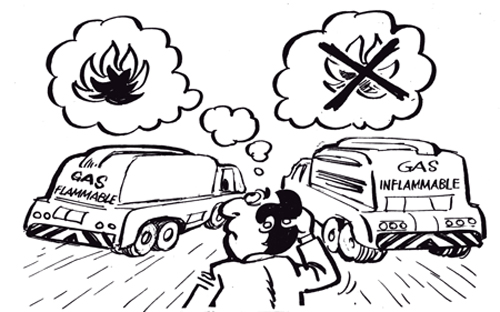The word inflammable actually means "able to burn"; while "nonflammable" means "unable or unlikely to burn".
The prefix "in-", used with inflammable is an intensifier not a "negative" as with such words as "inhospitable", "inhuman", "insensible", "indecent", "inadequate", etc. It has been a mistake believed by many people that inflammable meant "not flammable" and some serious injuries resulted over the years because of this misunderstanding.
As a consequence, many English-speaking countries passed laws that have required manufacturers of materials and substances that burn easily to use the word "flammable" in place of inflammable, which is considered less ambiguous or confusing.
So remember that inflammable comes from "inflame", which, in this case, means "to set on fire" and not from "in-", "not" + "flammable", "combustible".
In the confusion at the store, which was caused by a customer's inflammable temper, Joseph was unable to read the sign to see if the can of solvent was flammable or nonflammable.
2. Easily aroused or excited, as to passion or anger; irascible: Her father had an inflammable disposition regarding the men she was dating.
Historically, flammable and inflammable meant the same thing; however, the presence of the prefix in- has misled many people into assuming that inflammable means "not flammable" or "noncombustible".
The prefix in inflammable is not, however, the Latin negative prefix in-, which is related to the English un- and appears in such words as "indecent" and "inglorious".
Instead, this in- is an intensive prefix derived from the Latin preposition in and it also appears in the word enflame, but many people are not aware of this derivation, and for clarity's sake it is advisable to use only "flammable" to give any kind of warnings about burning or catching on fire.

